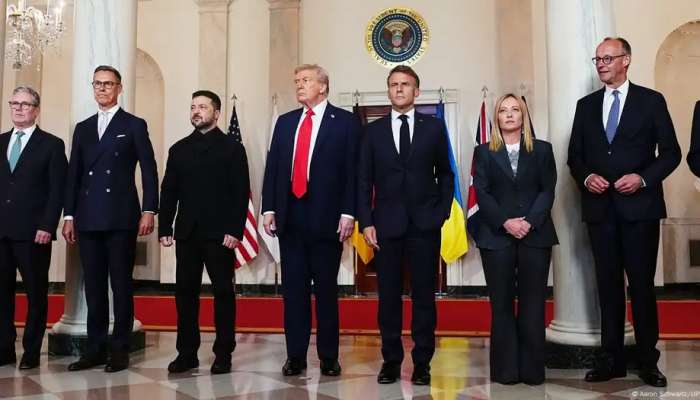
Washington, DC: The mood at the White House in Washington, D.C., on Monday appeared quite different from the debacle earlier this year when US President Donald Trump and Vice President JD Vance scolded Ukrainian President Volodymyr Zelenskyy in front of the cameras.
On Monday, Zelenskyy walked into the Oval Office in a crisp navy suit, not his trademark olive fatigues, and handed Trump a personal letter from his wife, Olena, to First Lady Melania Trump. The letter, thanking her for raising the plight of Ukraine’s abducted children with Putin, seemed to set a more diplomatic tone.
European leaders were determined to support him. German Chancellor Friedrich Merz, French President Emmanuel Macron, UK Prime Minister Keir Starmer and European Commission President Ursula von der Leyen were among those who made the trip to Washington on short notice. They sat in a protective semicircle around Zelenskyy, keen to ensure that another Oval Office humiliation was avoided and that the trans-Atlantic alliance held.
“This was a meeting where Europeans had the chance to show their unity and determination,” said Almut Möller, Director of European and Global Affairs at the European Policy Centre, to DW.
Progress on security guarantees
The European leaders’ clearest goal of the White House talks was Trump’s public endorsement of security guarantees. The US president delivered; standing beside Zelenskyy, he pledged that the US would “coordinate” with Europe on protections for Ukraine.
NATO Secretary-General Mark Rutte described them as “Article 5-type guarantees” without NATO membership. Article 5 is the alliance’s mutual defense clause, stating that an attack on one member nation is an attack on all.
That reassurance mattered in Europe, as fear had risen that Trump might again lean towards Russia after he met President Vladimir Putin in Alaska on Friday.
Yet the details of the security guarantees remain undefined. Trump equally pushed back on Europe’s call for a ceasefire as a starting point.
After the meeting, Rutte told Fox News, a US news broadcaster, that there are currently 30 countries in the mix in the so-called “Coalition of the Willing.” Their defence ministers could meet as early as this week to begin ironing out the details of these security guarantees.
Zelenskyy was hopeful, telling reporters the guarantees will “be formalised on paper within the next week to 10 days.”
In an interview with DW, researcher Tinatin Akhvlediani at the Brussels Centre for European Policy Studies (CEPS) evaluated these announcements of security guarantees as an essential step, “especially if the United States is engaged in backing them up.”
However, she warns that this backup is essential “because, as we know, the United States currently provides the military equipment and weaponry that the EU cannot replace.”
Land concessions off the agenda but not off the table
Equally important was what did not happen. During the meeting, there was no mention of Ukraine ceding territory. The Financial Times reported that one European official who was part of the delegation to Washington said that Trump explained, “That is not my business, that is a matter for Ukraine,” effectively ruling out forcing land swaps.
Akhvlediani maintained that the risk remains. “We will have to see what happens next, as we don’t know what exactly happened behind closed doors.”
As of now, Putin continues to demand Ukrainian withdrawal from parts of Donetsk and Luhansk. French President Macron openly voiced doubts about the Kremlin’s intentions: “His ultimate goal is to take as much territory as possible,” the French president warned.
A pivotal meeting ahead?
According to the Kremlin, Trump interrupted the talks with Zelenskyy and the European leaders to conduct a 40-minute call with Putin. The US president then moved the process forward by proposing a trilateral summit with himself, Zelenskyy and Putin, possibly within weeks.
While no date and location have been set, European leaders said they would support such a meeting if it reinforced Ukraine’s sovereignty and avoided concessions imposed from outside.
Both analysts agree that such a meeting is of utmost importance. “Putin now has to show that he wants peace,” Möller said.
For Europe, direct talks between Ukraine and Russia carry both opportunity and risk. It could mark the beginning of a genuine peace process or open the door to renewed pressure on Ukraine to compromise, this time without European leaders by his side.
Europe’s new role
For the European leaders in attendance, the summit went beyond its outcomes. The talks showed that Europe can be more than a bystander and is willing to go the extra mile regarding security guarantees, Möller said.
“This is about each and every European leader sitting in this room, knowing that there is a threat out there that this threat might affect their own country. This has brought them together,” he said.
German Chancellor Merz echoed that in an interview after the meeting. “This isn’t just about Ukraine’s territory; it’s about the political order of Europe. Germany has a major interest and a major responsibility.”
The mood in Europe was cautiously optimistic after the summit. “Since Trump returned to the White House, the trans-Atlantic alliance has never been as strong,” Akhvlediani argued, stressing that European leaders had succeeded in steering him back toward historical allies.
The outcome of the talks also remains provisional. “Trump can change his views very quickly,” Möller notes. “This is an evolving situation, and I am hesitant to think of this as a very important moment in this process towards finding peace for Ukraine and territorial integrity for Ukraine.”
More steps will be needed, yet one lesson stood out: Europe has no choice but to stand united. The challenge is immense, Möller added, but “Europe has no alternative but to try, and they are doing the right things.”